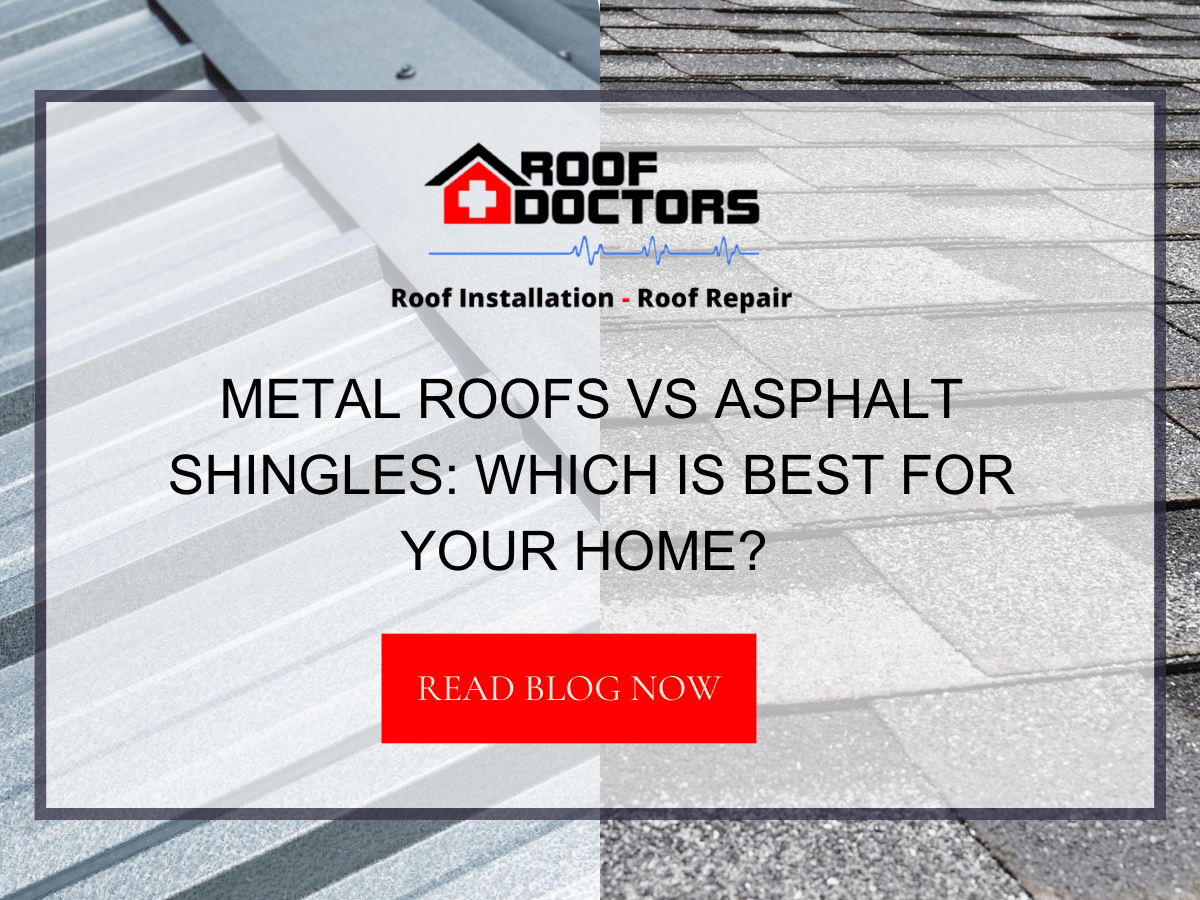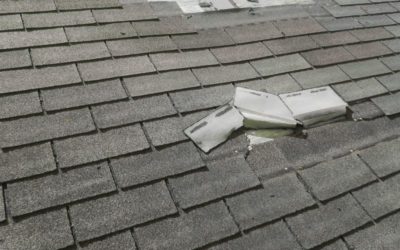When choosing a roofing material, homeowners often find themselves weighing the pros and cons of metal and asphalt roofs. One important factor that influences this decision is cost.Which is best for your home Metal Roof vs. Asphalt shingles?
For many years Roof Doctors have been installing and replacing metal and asphalt roofs. With expertise in both materials, they ensure top-notch service and superior roofing solutions to meet your needs.
Understanding the difference in cost between metal and asphalt roofs is essential for making an informed choice that aligns with your budget and long-term goals. Let’s delve into the cost comparison of these two popular roofing options.
What Is a Roof?
A roof is the uppermost covering of a building, providing protection against weather conditions such as rain, snow, sunlight, and wind.
Beyond its functional purpose, a roof also contributes to the overall aesthetic appeal of a structure. Different roofing materials offer varying durability, energy efficiency, and longevity levels.
What Are the Different Types of Roofs?
Finding the perfect roof for your house may seem like a challenging task. Roofs come in various styles and materials, each catering to different needs and architectural preferences. Some common roof types include gable roofs, flat roofs, hip roofs, gambrel roofs, and shed roofs.
The choice of roof type depends on factors such as climate, budget, architectural design, and personal preferences.
Pros and Cons of Metal Roofs vs. Asphalt Shingles
Metal roofs and asphalt roofs are two popular choices for homeowners, each with its own set of advantages and disadvantages. While metal roofs offer durability and energy efficiency, asphalt roofs provide affordability and easy installation.
Let’s delve into the pros and cons of these roofing materials to help you make an informed decision.
What are the pros and cons of metal roofs?
Metal roofs have gained popularity recently due to their durability and sleek appearance. Here are some key advantages and disadvantages of metal roofs:
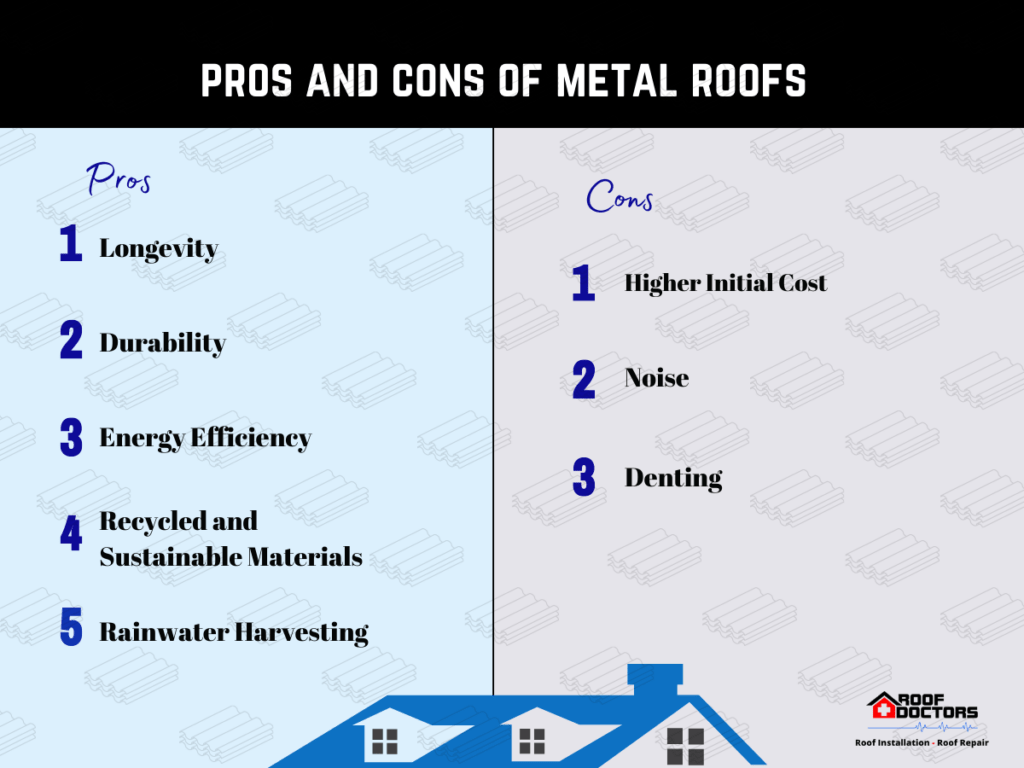
Pros:
- Longevity: Metal roofs can have a significantly longer lifespan than asphalt shingles, often lasting 40-70 years.
- Durability: They are highly resistant to fire, rot, insects, and mildew, making them an excellent choice for areas prone to such risks.
- Energy Efficiency: Metal roofs can reflect solar radiant heat, reducing cooling costs during hot summers.
- Low Maintenance: They require minimal maintenance and are less likely to suffer from leaks or damage.
- Eco-Friendly: Metal roofs are often made from recycled materials and can be recycled at the end of their lifespan, making them an environmentally conscious choice.
Cons:
- Higher Initial Cost: Metal roofs tend to have a higher upfront cost compared to asphalt shingles, making them a larger investment initially.
- Noise: During heavy rain or hail, metal roofs can be noisier compared to other materials. However, proper insulation and underlayment can mitigate this issue.
- Denting: Some metal roofs may be susceptible to denting from hail or falling debris, although this can vary based on the specific metal used.
What are the pros and cons of asphalt shingles?
Asphalt shingles have long been popular for residential roofing due to their affordability and versatility. Here are some advantages and disadvantages of asphalt shingles:
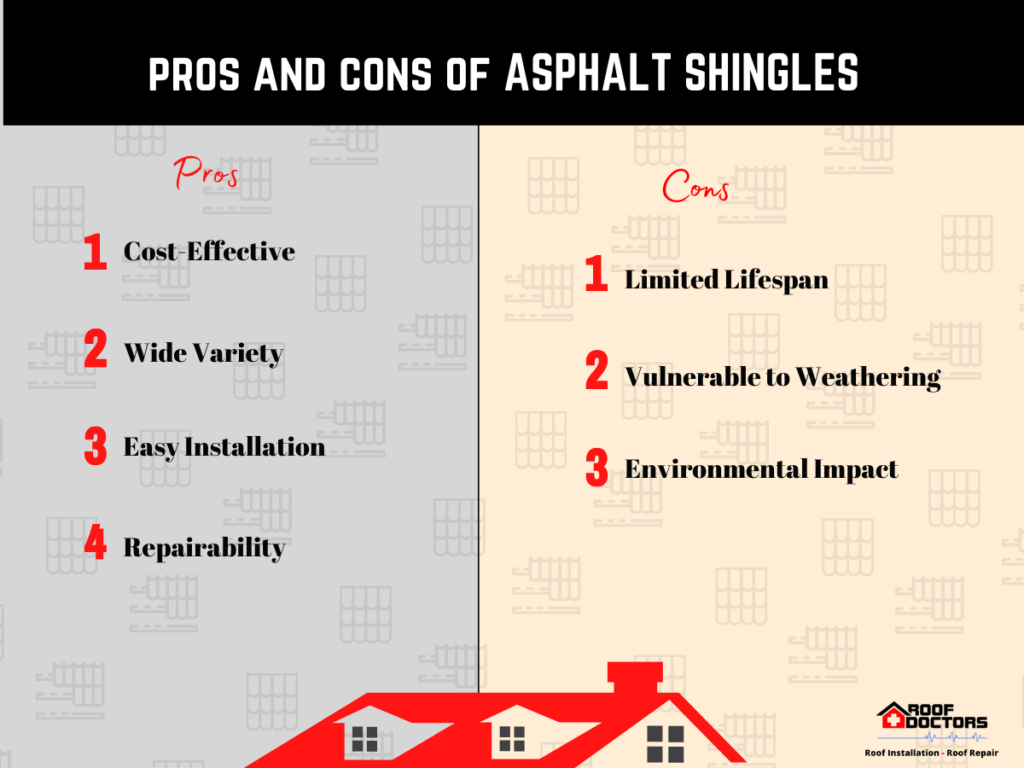
Pros:
- Cost-Effective: Asphalt shingles are generally more budget-friendly upfront, making them a popular choice for homeowners on a tighter budget.
- Wide Variety: They come in a vast array of colors, styles, and textures, allowing homeowners to find a design that suits their preferences.
- Easy Installation: Asphalt shingles are relatively easy to install, which can save on labor costs during the roofing process.
- Repairability: In case of damage, individual asphalt shingles can be replaced without replacing the entire roof.
Cons:
- Limited Lifespan: Asphalt shingles have a shorter lifespan compared to metal roofs, typically lasting around 15-30 years, depending on the quality.
- Vulnerable to Weathering: They can be susceptible to weathering, especially in extreme climates, which may result in cracking, curling, or discoloration over time.
- Environmental Impact: Asphalt shingles are not as environmentally friendly as metal roofs, as they contribute to landfills due to their shorter lifespan.
How Much Does a Metal Roofs vs. Asphalt Shingles?
When it comes to roofing materials, two popular choices among homeowners are metal roofs and asphalt shingles. While each has its own set of advantages and disadvantages, one crucial aspect that often influences the decision-making process is cost.
Let’s take a closer look at how much a metal roof costs compared to shingles and explore the factors that contribute to the price difference.
Metal Roof Costs
Metal roofs are known for their durability, longevity, and energy efficiency, making them an attractive option for many homeowners. However, these benefits come at a higher initial cost compared to asphalt shingles.
The cost of a metal roof can vary depending on several factors, including the type of metal, quality of materials, roof complexity, and location. Metal roofs can cost between $150 to $600 per square (100 square feet) for materials and installation.
Types of Metal
The type of metal used for the roof significantly impacts the overall cost. Common types of metal used for roofing include:
- Steel- is one of the most affordable options for metal roofing. It offers good durability and is often coated with zinc or a combination of zinc and aluminum to enhance its corrosion resistance.
- Aluminum- is lightweight, rust-resistant, and a popular choice for coastal areas due to its resistance to saltwater corrosion. It is generally more expensive than steel but still falls within a reasonable price range.
- Copper- is a premium metal roofing material known for its elegance and distinctive aging process, which creates a unique patina over time. It is the most expensive metal roofing option and is often chosen for high-end or historic properties.
- Zinc- is a durable and environmentally friendly option with a longer lifespan than most other metals. It is typically more expensive than steel and aluminum but offers excellent longevity.
Quality of Materials:
The quality of the metal roofing materials also affects the overall cost. Thicker gauge metals and higher-grade finishes tend to be more expensive but can offer superior durability and performance.
Investing in higher-quality materials may increase the upfront cost but can lead to cost savings in the long run by reducing maintenance and replacement needs.
Roof Complexity
The complexity of the roof’s design, including its pitch, angles, and additional features like skylights or chimneys, can impact the installation process and, consequently, the cost. A more intricate roof design may require more labor and materials, contributing to a higher overall cost.
Location
The location of your home can influence the cost of a metal roof due to factors such as local labor rates, building codes, and transportation expenses. The climate of an area may also affect the choice of metal and additional features required for insulation or weatherproofing.
Asphalt Shingle Costs
Asphalt shingles are the most commonly used roofing material in North America due to their affordability and versatility. They come in various styles and colors, making them suitable for a wide range of architectural designs.
The cost of asphalt shingles is generally lower than metal roofs, but it can vary depending on the quality and brand. Asphalt shingles can cost between $70 to $150 per square for materials and installation.
Types of Asphalt Shingles:
Asphalt shingles are available in two main types:
- 3-Tab Shingles: These are the most basic and economical options, featuring a flat, single-layer design. While they are less expensive, 3-tab shingles have a shorter lifespan compared to architectural shingles.
- Architectural Shingles (Dimensional or Laminate Shingles): These shingles have multiple layers, giving them a more textured and dimensional appearance. They offer better durability and longevity than 3-tab shingles but are slightly cheaper.
Quality of Materials:
The quality of the asphalt shingles also affects the cost. High-quality shingles with advanced features, such as impact resistance or energy-efficient coatings, tend to be more expensive but offer improved performance and longevity.
Roof Complexity and Location:
Similar to metal roofs, the complexity of the roof design and the location of the home can influence the cost of asphalt shingle installation. A more complex roof may require additional labor and materials, contributing to a higher overall cost.
Cost Comparison of Metal Roofs vs. Asphalt Shingles
In general, the cost of installing a metal roof can be 2 to 3 times higher than that of asphalt shingles. While metal roofs have a higher initial investment, they often provide better value over time due to their longer lifespan, energy efficiency, and reduced maintenance costs.
Metal roofs can also increase the resale value of a home and may qualify for energy-efficient tax credits or insurance discounts.
On the other hand, asphalt shingles remain a popular and cost-effective option, especially for homeowners on a tighter budget or those who plan to sell their homes in the near future. Asphalt shingles offer a wide variety of styles, colors, and designs to suit different architectural preferences.
It is important to note that while the upfront cost is a significant consideration, it is equally essential to weigh the long-term benefits and value of each roofing material. Consulting with a reputable roofing contractor, such as Roof Doctors, can provide valuable insights and help you make an informed decision based on your specific needs, budget, and goals for your roofing investment.
Which is Best for Your Home Metal Roofs vs. Asphalt Shingles?
When choosing between Metal Roofs vs. Asphalt Shingles for your home, several factors need to be considered. Each roofing material has its own advantages and disadvantages, and the best choice depends on your needs, climate, budget, and personal preferences.
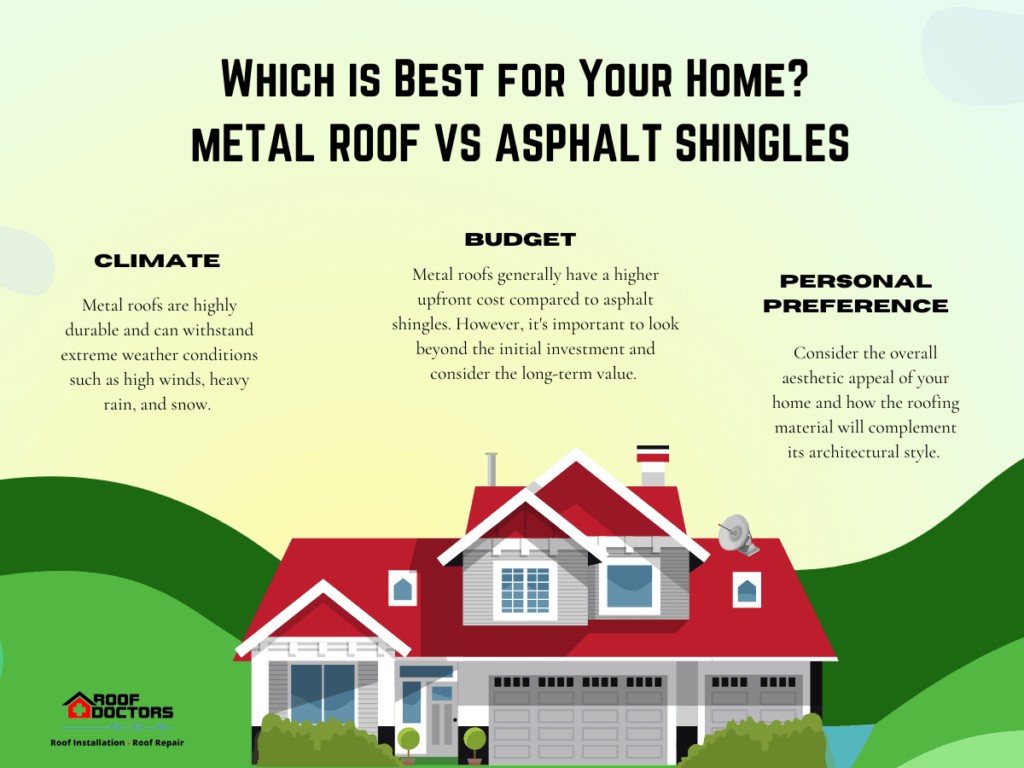
Climate
The climate of your location plays a significant role in determining the suitability of roofing material. Metal roofs are highly durable and can withstand extreme weather conditions such as high winds, heavy rain, and snow.
They are also resistant to rot, insects, and mildew. Therefore, metal roofs are an excellent choice for areas with harsh climates or frequent severe weather events.
On the other hand, asphalt shingles are more common in moderate climates. They can withstand moderate wind speeds and offer good insulation.
However, they may be more prone to damage from heavy storms, hail, or extreme temperature fluctuations. Asphalt shingles can be a cost-effective and suitable option if you live in an area with mild weather patterns.
Budget
Budget is an important consideration for most homeowners. Metal roofs generally have a higher upfront cost compared to asphalt shingles. However, it’s important to look beyond the initial investment and consider the long-term value.
Metal roofs have a longer lifespan and require less maintenance, which can offset the higher initial cost over time. Additionally, metal roofs offer energy-saving benefits that can reduce utility bills in the long run.
Asphalt shingles are more affordable upfront and have lower installation costs. If you have budget constraints or are planning to sell your home in the near future, asphalt shingles may be a more cost-effective choice. However, remember that they may require more frequent repairs or replacement compared to metal roofs.
Personal Preference
Personal preference is essential when selecting a roofing material. Consider the overall aesthetic appeal of your home and how the roofing material will complement its architectural style.
Metal roofs have a modern and sleek appearance, which can enhance the curb appeal of contemporary or industrial-style homes. On the other hand, asphalt shingles offer a wide variety of colors, textures, and styles, allowing you to find an option that matches your desired look.
Key Takeaways
Metal roofs and asphalt shingles have their own set of advantages and disadvantages. Metal roofs offer exceptional durability, energy efficiency, fire resistance, and low maintenance, although they come with a higher upfront cost.
On the other hand, asphalt shingles are more affordable, offer a wide variety of styles, and are easier to install. Still, they are not as durable or energy-efficient as metal roofs and require more maintenance.
When choosing the best roof for your home, it is crucial to consider factors such as climate, budget, and personal preferences. Assessing the specific needs of your location, evaluating your financial limitations, and aligning with your desired aesthetics will guide you toward the optimal choice.For professional roof repair or replacement services, you can trust Roof Doctors. With their expertise and experience, they can assist you in making an informed decision and ensure the proper installation and maintenance of your chosen roofing material.

